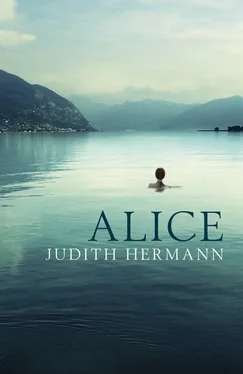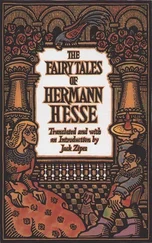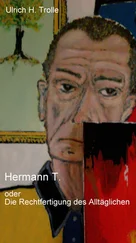Judith Hermann - Alice
Здесь есть возможность читать онлайн «Judith Hermann - Alice» весь текст электронной книги совершенно бесплатно (целиком полную версию без сокращений). В некоторых случаях можно слушать аудио, скачать через торрент в формате fb2 и присутствует краткое содержание. Год выпуска: 2011, Издательство: Clerkenwell, Жанр: Современная проза, на английском языке. Описание произведения, (предисловие) а так же отзывы посетителей доступны на портале библиотеки ЛибКат.
- Название:Alice
- Автор:
- Издательство:Clerkenwell
- Жанр:
- Год:2011
- ISBN:нет данных
- Рейтинг книги:3 / 5. Голосов: 1
-
Избранное:Добавить в избранное
- Отзывы:
-
Ваша оценка:
- 60
- 1
- 2
- 3
- 4
- 5
Alice: краткое содержание, описание и аннотация
Предлагаем к чтению аннотацию, описание, краткое содержание или предисловие (зависит от того, что написал сам автор книги «Alice»). Если вы не нашли необходимую информацию о книге — напишите в комментариях, мы постараемся отыскать её.
Alice — читать онлайн бесплатно полную книгу (весь текст) целиком
Ниже представлен текст книги, разбитый по страницам. Система сохранения места последней прочитанной страницы, позволяет с удобством читать онлайн бесплатно книгу «Alice», без необходимости каждый раз заново искать на чём Вы остановились. Поставьте закладку, и сможете в любой момент перейти на страницу, на которой закончили чтение.
Интервал:
Закладка:
Raymond went swimming; Alice read the Sunday paper without understanding a single word, without wanting to understand. The rustling of the pages. Frogs in the wet sand. At a safe distance from the shore the unpleasantly small head of a water snake. Some birds Alice did not recognise flying above the lake. Kites? She’d always found the name intriguing, had never known what the bird itself looked like. Was she mistaken? Alice shrugged, yes, possibly. Raymond came back, breathing the way you breathe when you’re just coming out of the water; he dried himself, looked back at the distance he’d swum.
Was it nice?
Well, of course. Aren’t you going in?
I’ll see, Alice said.
Raymond drank some tea, ate an apple, opened the newspaper. Alice watched as a mosquito settled on his left shoulder, pushed its proboscis under his skin, and pumped with the hind part of its body, calmly and for a long time. She watched Raymond reading, his chin resting in his hand. He was elsewhere, in a parallel world; twice he smiled at something. Then he folded the paper, got up, and stretched until his bones cracked. Bent his head to the right and to the left, the neck vertebrae cracking. He said, I’ll take a turn around the lake, disappearing between the black yet simultaneously bright tree trunks. Blotches of light in the grass. Busy ants, wasps around the remains of his apple, the tea in the tin cup, cold. Alice fell asleep, in a second-long dream the male nurse put away all the things on the table in Richard’s room, then pulled off the blue tablecloth, doing it all with a distinctly chilly ‘that’s-how-things-stand’ expression. She was startled awake as her head fell to one side like the Vietnamese flower seller’s had in the hall of the Prenzlauer Allee train station. Raymond was standing with his feet in the water, looking out across the dark lake. He said, We have to leave, Alice. I’m on the night shift today. Clouds covered the sun. It had suddenly turned cool. Even as the nurse in the dream had been picking up Richard’s glasses.
Alice packed up. They shook out the blanket together, threw the remains of the apples into the reeds. Folded up the crumpled, messy newspaper. The paper seemed to have doubled in size. I’ll be right there, Alice said. That old disquiet on excursions, at the end always sentimental and wistful, as if it had been their last, as if it might have been their last. She hadn’t gone swimming. Should she have? She should have done everything differently, not just today, but always. Done everything differently. She walked behind Raymond on the path, then she walked beside him, took his hand; they held hands the rest of the way. He was carrying the basket; she, the blanket and the newspaper. They met no one.
What sort of arrangement did you make with Margaret? Raymond asked.
He had suddenly remembered again.
She’ll call me, Alice said. She’ll phone when it’s over.
Half an hour in a traffic jam on the motorway. Alice took off her shoes, put her feet up on the dashboard as she used to do fifteen years ago, fiddled with the radio and rolled down the window. At the side of the road a strip of shoulder, cornfields, windmills. At the far end of the twinkling chain of cars, the silhouette of the TV tower. Both of them looked at it. Raymond turned off the radio, then the engine. He looked at his watch and made an involuntary irritable sound. They had left in good time; he wouldn’t be late, yet in spite of that he was on edge. Alice wondered whether she ought to tell him about her dream. But she was afraid of its interpretation, not what it would say about Raymond, but about herself. She unbuckled her seat belt, took her feet off the dashboard. She said, You got sunburned. Raymond said, I know.
On the other side of the motorway, an occasional car drove by, heading north. We should have taken the secondary road. Probably wouldn’t have been any better. The windmills turned slowly, casting strange rotating shadows in the dry fields. Raymond started the engine again. They were both tired. Then the traffic jam dissolved.
The apartment was as quiet as if they’d been away a long time. The kitchen window facing the courtyard was wide open; Alice watered the flowers on the windowsill. Flowers with blue leaves whose name she didn’t know. Raymond didn’t either. Thirteen blue leaves and a little flower head on each one. Alice had counted them. Tiny spiders had woven their webs between the stems. The mercury in the thermometer on the house wall above the flower box stood at 27 °C. A pale half moon was already visible in the sky. Signs of a thunderstorm above the rooftops, absolutely no wind now.
And what else are you doing today. Tonight.
Raymond was standing in the doorway to the kitchen; he’d taken a shower and put on another T-shirt; his skin was slightly reddened, and there were faint rings under his eyes. The T-shirt covered the tattoo on his left arm: ‘The last shall be the first.’ Alice was as afraid of the meaning of this tattoo as of the meaning of her dreams. Years ago she had asked Raymond not to tell her why he had had this sentence tattooed in calligraphy on his arm, and Raymond had promised not to. He had kept his promise.
I’m not doing anything, she said.
She was standing by the kitchen window holding the bottle of water for the flowers; she looked at Raymond; there would be nothing he could say, but for one moment she did look at him the way she felt — helpless and close to tears.
What should I do? I’ll wait for Margaret’s phone call. I keep thinking about it. I’m thinking about it now. At the lake I didn’t think so much about it. It’s not bad; don’t worry about me. I’ll just stay home.
She shook her head. Set the water bottle down on the windowsill. There seemed to be something about her that kept Raymond from touching her, from putting his arms around her — how do you say it — she couldn’t think of the word embrace; she wished he would go now.
Till tomorrow morning, Raymond said. He gave her a searching look.
Yes, till tomorrow morning.
Call me if Margaret phones.
I will, Alice said.
Promise.
Sure. She walked him to the door. Then went across the hall to the bedroom. Pulled up the blinds, opened the window, and leaned out. It took a while. Sometimes it took so long that Alice thought he would never come out. And what then?
Raymond stepped out of the house. His jacket slung over his shoulder. He disappeared from sight under the awning, emerged again at the corner of the street, crossed at the intersection. He went over to the other side of the street and walked along the edge of the park. Just as Alice had yesterday on her way to Margaret and Richard’s. Had Raymond watched her yesterday?
She hadn’t turned round. Now, she could see Raymond walking — among all those people on the street, in the park, in the cafés, at the tables in the shade of the trees, he was the one she knew and knew about yet didn’t understand. He turned round, looked up at their apartment, raised his hand, and waved. Alice waved back. Then he was gone. She kept looking out of the window for a while longer. The last of the children left the park; the street lights went on. In the basketball court, hidden by the leaves of the trees, someone was still throwing a ball into the basket, again and again. Open windows, profusely planted balconies, and the water from the flowers dripping down on the pavement. A ring of fiery clouds around the sun hanging low in the sky. Tomorrow was Monday. Alice closed the window. She lowered the blind, searched for the phone, and found it on the floor beside the bed, next to Raymond’s open book. The street lamps buckled weakly, newsstands and advertising columns dissolved into the air, everything everywhere crackled, hissed, and rustled, became porous and transparent, turned into little piles of dust, and disappeared. In the distance the outlines of the Town Hall tower became blurry and blended with the blue sky. For a while the old tower clock, detached from everything else, still hung suspended in the sky until it too vanished. Alice took the book and the phone and went back to the kitchen. Pulling a chair over to the table, she sat down, placed the phone next to the book, and continued reading.
Читать дальшеИнтервал:
Закладка:
Похожие книги на «Alice»
Представляем Вашему вниманию похожие книги на «Alice» списком для выбора. Мы отобрали схожую по названию и смыслу литературу в надежде предоставить читателям больше вариантов отыскать новые, интересные, ещё непрочитанные произведения.
Обсуждение, отзывы о книге «Alice» и просто собственные мнения читателей. Оставьте ваши комментарии, напишите, что Вы думаете о произведении, его смысле или главных героях. Укажите что конкретно понравилось, а что нет, и почему Вы так считаете.












